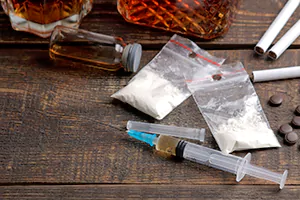
Break Free From The Chains of Heroin Addiction Through Our Personalized Rehab Programs.
Heroin Addiction Rehab in Virginia
Heroin is a highly addictive opioid. Heroin addiction rehab helps individuals overcome their dependence on heroin to regain a sober and decent life once again. Rehabilitation facilities provide specific treatment plans designed to meet the particular difficulties brought on by heroin addiction. Intensive therapy and support are provided to patients during their prolonged stay at the hospital in an organized and immersive setting during inpatient rehab. With the flexibility that Rehan Avenue outpatient programs offer, people can attend therapy sessions and stay in their homes. The first stage is usually detoxification, which focuses on carefully treating withdrawal symptoms. In addition to addressing the behavioral and psychological components of addiction, heroin addiction treatment aims to achieve physical detoxification in order to support long-term recovery and a drug-free, healthier lifestyle.
Embark On A Transformative Journey To Recovery With Our Holistic Heroin Addiction Rehab
Personalized Strategies in Heroin Addiction Rehab
We provide heroin addiction rehab programs in Virginia. Our best heroin addiction rehab services are heroin addiction behavioral therapies and heroin addiction medication-assisted treatment.
Heroin Addiction Rehab Process in Virginia
A multifaceted strategy is used in the heroin addiction treatment procedure to address the psychological as well as the physical components of addiction. Medication-assisted therapy (MAT), which makes use of drugs like buprenorphine or methadone, can be used to help control cravings and withdrawal symptoms. Detoxification, medical monitoring, and rigorous therapy interventions can all be undertaken in a structured and encouraging environment during Inpatient Rehabilitation. These therapeutic therapies cover a variety of techniques, such as behavioral therapy, which assists people in recognizing and altering negative thought and behavior patterns linked to heroin use. For people with co-occurring mental health illnesses, dual diagnosis treatment is essential since it treats both addiction and underlying psychiatric conditions. Aftercare planning is also emphasized in the rehab process to make sure people have the resources and support they need to continue their recovery.
FDA-Approved Medications to Treat Heroin Addiction in Virginia
The FDA has approved a number of drugs that effectively treat heroin addiction with the goal of addressing opioid dependence and assisting in the recovery from substance misuse. Due to their ability to reduce cravings and lessen the negative consequences of quitting heroin, medications including methadone, buprenorphine, and naltrexone are essential for the management of withdrawal symptoms. Opioid agonists such as buprenorphine and methadone assist people in tapering off heroin use gradually while lessening the symptoms of withdrawal. Opioid antagonists like naltrexone inhibit the effects of opioids and prevent relapse. These drugs are frequently included in all-inclusive rehabilitation programs that pair addiction counseling with pharmacology. Whether given one-on-one or in groups, addiction counseling plays a critical role in addressing the psychological components of addiction, assisting clients in creating coping strategies, and creating a supportive atmosphere that promotes long-term recovery.

Speak To Our Heroin Addiction Rehab Specialists
Contact us today to discuss your needs and explore how our rehab programs can help you achieve lasting recovery.
Effects of Heroin in Virginia
Strong opioids like heroin, which are made from morphine, have a significant impact on the human body and can have a variety of negative psychological and physical impacts. Opioid Addiction is one of the most important and dangerous consequences of heroin usage, whereby users have an overwhelming need to seek out and use the substance despite its negative effects. Heroin consumption causes depression in the central nervous system, which significantly slows down cognitive and physical processes. Heroin suppresses the brain's respiratory centers, which can lead to respiratory depression, a potentially lethal condition marked by shallow breathing or, in extreme situations, respiratory failure. Heroin abuse that is prolonged has also been connected to memory impairment, impairing cognitive abilities and causing long-term cognitive problems.
Inpatient Rehab For Heroin Addiction in Virginia
One thorough and extensive method for addressing the complications of substance abuse is inpatient rehabilitation for heroin addiction. This type of care entails a residential program where patients receive 24-hour care in a monitored setting. With a variety of therapeutic interventions and counseling sessions targeted at addressing the psychological, emotional, and behavioral elements of heroin addiction, inpatient rehab offers a regulated and supportive environment that is conducive to recovery. Medication-assisted treatment, which uses drugs to reduce cravings and withdrawal symptoms, may be used to help patients make a more seamless transition to sobriety. In addition to guaranteeing prompt medical response in an emergency, inpatient rehab's round-the-clock care promotes a positive, supportive environment where patients may exchange stories and bolster one another's will to become well.

Diagnosing Heroin Addiction in Virginia
A thorough assessment procedure is used to diagnose heroin addiction, utilizing a range of screening instruments and recognized diagnostic criteria. Specific criteria for opioid dependency, including heroin addiction, are provided by the Diagnostic and Statistical Manual of Mental Disorders (DSM-5). In order to measure the level of substance use and its influence on an individual's life, professionals usually use addiction screening tools during health exams. Combining these diagnostic tools makes it easier for medical professionals to make an accurate diagnosis, which in turn makes it easier to create specialized interventions that deal with the psychological and physical elements of heroin addiction. To maximize the likelihood of a full recovery, prompt and efficient care necessitates an early and correct diagnosis.
Symptoms of Heroin Addiction in Virginia
The symptoms of heroin addiction encompass a range of physical, behavioral, and psychological indicators that collectively characterize opioid dependence and substance use disorder. Individuals grappling with heroin addiction often exhibit compulsive drug-seeking behavior, neglecting responsibilities and social relationships in favor of obtaining and using the drug. The development of a tolerance to heroin, necessitating increased amounts to achieve the desired effect, is a common sign of addiction. Withdrawal symptoms, such as nausea, muscle pain, anxiety, and insomnia, may manifest when the drug is not taken, further reinforcing the cycle of dependence. Frequent and unsuccessful attempts to quit or cut down on heroin use, despite recognizing its adverse consequences, are key elements in diagnosing substance use disorder.
Rehab Options for Heroin Addiction in Virginia
Options for heroin addiction rehabilitation include a wide variety of strategies designed to satisfy the specific requirements of those who want to get well. Explore comprehensive therapy options, including our specialized Internet Addiction Rehab program, provided via inpatient rehab. This offers round-the-clock care in a structured setting with an emphasis on skill-building, counseling, and detoxification. For those who might not need round-the-clock supervision, outpatient programs provide flexibility, enabling participants to attend therapy sessions on a scheduled basis without interfering with their everyday activities. In order to facilitate a more seamless transition to sobriety, medication-assisted therapy employs drugs like buprenorphine or methadone to reduce cravings and withdrawal symptoms. To address the psychological components of addiction, counseling and behavioral therapies are frequently coupled with these drugs.
Heroin Addiction Rehab Programs in Virginia
Programs for treating heroin addiction include a variety of research-proven therapies intended to address the intricate nature of substance abuse. One of the mainstays of addiction treatment is behavioral therapy, which assists patients in recognizing and changing harmful drug-related behaviors and cognitive patterns. In a safe and encouraging setting, group therapy allows patients to talk about their experiences, acquire new perspectives, and get support from others going through similar struggles. Relapse prevention techniques give people the coping mechanisms and techniques they need to avoid relapsing into substance abuse. The creation of a thorough plan for continued assistance and relapse prevention beyond the conclusion of an official rehab program is known as aftercare planning, and it is essential to maintaining recovery.



